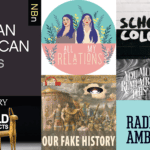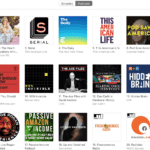How Podcasts Fight Falsified History

While living through a time constantly touted as historically significant, it is difficult to ignore the force of history in our daily lives. In gaining this self-awareness of “living through history,” every experience and documentation feels like a relic, a precious archive of your own personal experience of the pandemic. In creating our own narratives of the pandemic, and considering how we will re-construct these stories in decades to come, questions begin to arise as to what stories will survive.
Unfortunately, in historical records to date, it is often only the stories of those with the most power, and therefore the most privileged, who survive. However, in coming to view History on our own, more personal terms in the pandemic, it is the stories of those historically suppressed who have gained the most traction in recent times.
In this process of reassessing our histories, it appears that our usual spaces of cultural understanding, in the form of the museums and galleries, have failed to revise and interrogate our past perceptions fully. This was particularly true in the aftermath of the Black Lives Matter protests, as cultural spaces and institutions pledged support of the movement, but continued to undervalue and under-represent the Black community within their exhibitions and in their leadership.
Instead, podcasts are attempting to fill the cultural gap, reconciling and revising historical narratives with unwavering clarity and dedication. Through a variety of podcasts, hosts have been able to realign the personal with the historical, making space for radical empathy and honest consideration of the people behind the history.

A podcast which encompasses this philosophy, whilst also fighting the spread of misinformation in the past and the present, is You’re Wrong About. Encompassing a vast subject matter of historical trends, figures and events, hosts Michael Hobbes and Sarah Marshall center empathy in considering and critiquing the historical record, and how it can often differ from the reality.
Read more: I Want You to Listen to Lolita Podcast
In one of their most acclaimed multi-part series, Hobbes and Marshall utilize their radically empathetic perspective in confronting the controversial history of Princess Diana, and her status as a cultural icon. Rather than attempting to rest their judgements in moral absolutes, painting Diana as wholly good and the royal family as wholly bad, Hobbes and Marshall invite an important level of nuance in their revising of past events. Instead of leaning too heavily into mourning for Diana and her legacy, they remain skeptical of sources when they need to be, and only judge individuals against their own moral misgivings. Frequently, Hobbes and Marshall will pause the narrative to discuss similar experiences they have faced, or have seen play out within contemporary society.
This important break from the past and realignment with the present is a necessary process to ground listeners in reality. As with many historical novels or academic histories, there is a constant attempt to sweep audiences up into the drama of the time, to ignore the moral misgivings of past cultures and civilisations, writing it off as being “a different moral era.”
However, throughout the podcast, we are forced to confront significant lessons from the past which are repeated time and again, regardless of how progressive a given era is. In this way, You’re Wrong About acts as a vital moral compass in our path to revising and reconsidering historical narratives in an honest, and genuine manner.
In spite of the severity of the subject matter in episodes of You’re Wrong About, the podcast remains a charming homage to pop culture and the issues of media literacy in creating an archive to these monumental moments of our shared histories. However, in looking to revise and reconsider History, there also needs to be a concerted effort to reconcile the discomfort and shame which many stories carry with them.

This process of exploring and sitting with the discomfort of shared histories is most apparent in 1619, produced by The New York Times. The podcast, spawned from New York Times Magazine’s 1619 project, is a historical analysis of how slavery shaped American political, social, and economic institutions.
Rather than positioning History as a force untethered to our existence, host Nikole Hannah-Jones positions the narratives of Black Americans at the center of this historical analysis. Throughout the series, Hannah-Jones actively invites the personal to sit alongside the historical, inviting in the experiences of other Black Americans to further investigate cultural perspectives and give insight into the nature of historical oppression. In a deeply unsettling and emotional finale, June and Angie Provost tell the story of how farm land, held by their family for generations, was covertly stripped away from them, in a scheme to actively undermine Black farmers and dispossess them of their land.
Read more: “Asking for It” Wants Honesty about Queer Domestic Violence
Although this modern-day story may feel like it belongs to the civil rights era of 1960s and 70s America, 1619 makes it starkly apparent that historic methods of racial discrimination are still alive and well in American society today. In sitting with the discomfort of the past, we are simultaneously able to confront our contemporary failings and address them. Rather than desperately clutching to the idea of the “post-racial society” as mythologized by the Obama era, 1619 forces us into the light of our own racism, and the systems which uphold it.
In spite of its thorough unpacking of historic and modern-day systems of racism and oppression, the project has consistently been critiqued by a body of historians, seemingly unwilling to believe 1619’s revised narrative. After critiquing the project’s ‘cynicism’, Princeton historian Sean Wilentz circulated a letter objecting to the project, gaining the signatures of James McPherson, Victoria Bynum, Gordon Wood and James Oakes, all leading historians at prestigious institutes. The letter accuses 1619 of “factual errors”, stating that the project represented “a displacement of historical understanding by ideology.” In response to the fact that all signatories are white historians, the letter states that “dismissals of objections on racial grounds – that they are the objections of only ‘white historians’ – has affirmed that displacement”.
Historians who declined to sign the letter stated doubts over the true purposes of the letter to dispel factual inaccuracies, with many suggesting an ulterior motive to discredit those challenging entrenched ideas of American identity, as upheld through specific historical narratives.
Although the podcast may have garnered criticism, its critics have failed to consider one key advantage which 1619 has in revising past narratives: its accessibility. On the whole, national spaces of cultural and historical exploration have failed to sit with the truth and discomfort of America’s racist past, with many organizations failing to even address their contemporary racist attitudes within their staff, let alone the racism of the past.
So, if not podcasts like 1619, then what will document and revise the narrative of America’s racist past in an accessible way? If we have any hope of confronting our own complicity in racism today, then Americans need to have accessible, deeply personal historical accounts, which academics have thus far been unable to provide.

Another project and podcast which similarly encourages the unpacking of shame and discomfort is Floodlines, produced by The Atlantic. Interweaving the background sounds of disaster, from the torrents of water to the haunting call-ins into radio stations, Floodlines is a visceral exploration of Hurricane Katrina, and its untold narratives.
In retelling the story of Hurricane Katrina, host Vann R. Newkirk II goes beyond the quietly tragic, simplified narrative we have come to rely on in explaining away Katrina. Rather, Newkirk centres the experiences of survivors, mourning the loss of a reality which could have been.
In choosing to center survivors, we are introduced to Le-Ann Williams, whose story begins just as Katrina hits New Orleans, when she is just 14 years old. Le-Ann excitedly recounts the joy of being enrolled at her competitive high school, dreaming of attending college, and embarking on an ambitious career. It feels like a life we’ve all aspired to, at some point. Then, on 29th August 2005, Katrina hit New Orleans. Over the course of the series, Le-Ann’s story is interwoven into the terrifying scenes of survival in New Orleans, as she continually finds herself displaced, never quite returning to the aspirational life she deserved.
In this way, Floodlines utilizes the individual experience in revising history. In framing the story of Katrina, it defies the “great men of history” trope, and embarks on understanding individuals with the same complexity and empathy we treat so-called icons of history with. Although Newkirk astutely analyses failures at Federal and State level, he continually focuses on how the consequences of action were felt in New Orleans, sitting with the shame and discomfort of human loss.
In the finale of Floodlines, Newkirk attempts to use this shame and discomfort to hold individuals accountable, in a remarkable and chilling interview with Michael Brown, the FEMA director at the time of Hurricane Katrina. Brown plays a careful game in framing his involvement with Katrina, allowing himself to admit mistakes, but never quite apologizing, never quite giving into any formal responsibility for the hurt and pain he inadvertently caused. The interview feels almost claustrophobic, as we are forced into the thin gap between basic human error and personal culpability, neither of which Brown firmly sits on.
Listening to Floodlines, and the testimony of Michael Brown, is made all the more haunting as we too experience a public crisis, which is only just nearing its conclusion. As we look to this revised account of Katrina, it feels almost inevitable that the same failures in upholding historical truth will crop up in our own historical narratives of the pandemic. When there is such a myriad of stories and experiences coming out of the pandemic, it’s a wonder as to what will survive, and what efforts we will put in to ensure that certain perspectives and narratives are protected.
However, in projects such as You’re Wrong About, 1619 and Floodlines, it appears that these efforts are already being made to protect hidden perspectives, and will once again be made by other revisionist podcasts in the future. In utilising this genre of cultural media, our understanding of historical periods will continually grow towards a more realistic, nuanced version of History.
In this way, we are creating a version of History that we would like to be remembered by, and a version of History that figures of the past deserve to be commemorated by, with the full force of human complexity and empathy.













Comments
Comments are closed.